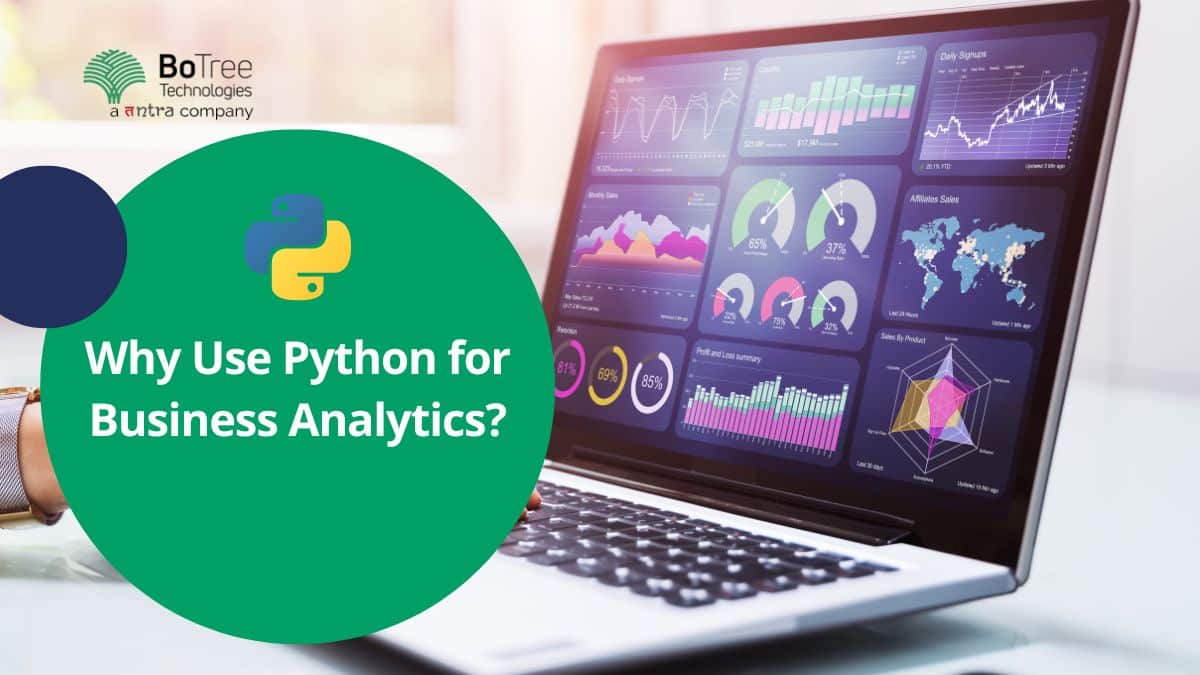
Why Use Python for Business Analytics?
Python is a commonly used programming language by a software development company. It has been designed on the philosophy that emphasizes code readability with indentation. As a result, it has multiple applications in data science, web development, system administration, automation, and more.
It has a very resourceful library and many open-source packages. As per online statistics, 1.4% of sites on the internet use Python. Out of those sites, 1.3% rank up in the top 1,000,000 sites on the web.
An enterprise software development company uses the language to provide development services to clients in healthcare, finance, technology, and more. In addition, the language is heavily used in machine learning for big data analytics.
Python app development is one of the most popular trends since the language is straightforward to read and learn. Moreover, the syntax of Python is clear and mimics the English language.
Read More: How Much Does it Cost to Build a Python Application?
Python for Business Analytics- Why use Python for Business Analytics?
Business analytics refers to collecting the necessary raw business data and analyzing it to gather meaningful insights that can help improve business operations, consumer behavior, marketing, product usage trends, and more.
The data analysis also helps identify any future opportunities or challenges and prepares in advance. It allows the business to find new revenue streams that can help in enhancing profitability.
Python app development is the best choice for business analytics. Here is why Python for business intelligence –
- Simple to Learn: Python has a syntax that matches the English language. Compared to other languages, it is effortless to learn.
- Community Support: Python is a popular language with robust community support. If the developers run into any problems, they can seek immediate support from other developers who may have faced the same problem.
- Off-the-Shelf Analytical Solutions: A Python library offers many great data analytics tools that work great for developing business analytics tools. The analyst can work very efficiently with such ready-to-use solutions.
How is Python Programming Language Useful for Business Analytics?
- Descriptive Analytics
- Typically performed by data analytics, descriptive analytics helps understand what has happened and evaluate the trends over time.
- Data analysis utilizes Python to engage in studying the data. Python data analysis tools help in profiling the data, visualizing results, and creating observations to assist in defining the next course of action.
- Predictive Analytics
- Python development services, such as BoTree Technologies, help businesses with custom ML solutions that help in predictive analytics. Predictive analytics helps prepare for the future by showing a window to possible events.
- Python programming language has become the most in-demand language for machine learning and is used to build networks for Bayesian networks, decision trees, and more.
- Prescriptive Analytics
- It is also known as decision science and occurs in the final phase of business analytics. It helps anticipate what, when, and why certain outcomes will happen. It also helps in deciding what to do with that information.
- Python development solutions are most commonly used for creating prescriptive analytics tools like deep learning, which uses artificial neural networks to enhance outcomes.
Leading Trends in Python Development for Business Analytics
The field of business analytics is fast evolving. Expert Python Django development solutions companies are developing new-age analytics solutions using new economy concepts such as AI/ML, Neural networks, and more. Some of them have been discussed below –
- Artificial Intelligence and Machine Learning
- The AI/ML sector developments are proving to be very beneficial to business analytics. AI-based business analytics enables organizations to use machine learning algorithms to identify trends and derive useful insights from complex datasets across different sources.
- AI helps by diving deep into the data and correlates simultaneous anomalies, revealing critical insight into business operations. Business analytics systems powered by AI and ML technologies can autonomously learn and adapt to changing data and understand behavioral patterns for more precision in detecting anomalies and deviations.
- Python is a key part of AI programming since it has a straightforward yet robust framework that helps develop AI/ML solutions.
- Big Data
- Big data analysis refers to the term for processing large amounts of data. The technique is used for the analysis of the market, customers, social media, healthcare, and other trends.
- With the massive digitization, a tremendous amount of user data can be used for better purposes. Big Data for business analysis ensures that the best information is available to businesses to gain important insights that can help expand the potential on the basis of better decision-making.
- Neural Networks
- The brain’s neural networks influence artificial neural networks. The technique uses the computing power of vast interconnected computer systems to process information quickly and automatically perform new tasks. As a result, they help in making accurate decisions.
- Neural networks can be used to mimic models related to customer behavior, purchase, and renewals and segment customers while analyzing credit line usage, loan advising, real estate appraisal, and more.
- It can be used in industries such as retail in addition to AI for making predictions and analyses which are more accurate. For example, it helps insurance companies to divide customers into groups to form pricing for each customer individually.
- Deep Learning
- Deep learning is a subset of ML. It has algorithms that enable nonlinear data processing for speedy analysis of complex data. Deep learning is baked into modern-day programming languages such as Python and R to develop solutions that can process large amounts of data.
- Deep learning technology is used to develop Virtual assistants, chatbots, the healthcare industry, entertainment applications, etc.
Why is Python for Business Analytics the most Suitable Option?
Python is amongst the most used programming languages. It is used for automation scripts, web development, data science, and system administration applications.
Here are the top reasons why Python data analysis tools are a good choice for business analytics –
- Advanced Modelling
- Businesses have data and want to fetch valuable insights from the same. Some of these insights require machine learning and AI-based systems for analysis since they are too complex to be understood manually. Dedicated python programmers can build applications that can help in activities such as –
- Price forecasting and economic modeling
- Product price elasticity estimation
- Product classification analysis
- Market segmentation study
- Businesses have data and want to fetch valuable insights from the same. Some of these insights require machine learning and AI-based systems for analysis since they are too complex to be understood manually. Dedicated python programmers can build applications that can help in activities such as –
- Working with Big Data
- The majority of enterprises have data in large volumes such that it can be called ’Big.’ Since enterprises want to service useful insights from their data, they depend on technologies that can help them with accurate prediction models.
- A python development company can help businesses with custom Big Data analysis solutions that help them derive useful insights from Big Data.
- Automation
- One of the greatest advantages of Python application development for business analysis is automation. Python is suitable for the development of applications that can help a business gain the ability to automate and replicate.
- Python can be used to automate many processes, such as –
- Repeating the analysis for the same markets
- Collection of data from online sources
- Repeating complex data task
- Handling errors in the text data to merge different datasets
- Python can be used to automate many processes, such as –
- One of the greatest advantages of Python application development for business analysis is automation. Python is suitable for the development of applications that can help a business gain the ability to automate and replicate.
Conclusion
Python is an open-source language. It has a wide community of professionals who openly contribute their ideas and provide solutions to problems being faced by other developers. From a business analysis point of view, Python application development is a convenient option.
The analysis is no longer constrained to just drawing some charts. Instead, a reasonable, sophisticated, and high-powered solution is needed to extract useful data buried inside the massive business data sets. Python development services can provide an app or web-based solutions that help to derive useful information from raw data.
Frequently Asked Questions
How is Python used for business analytics?
Data analysts often use Python for business analytics to categorize current data. In addition, they indulge in exploratory data analysis, which involves profiling the data, visualizing results, and defining observations to make for the next steps in the analysis.
Is Python important for Business Analysis?
The knowledge of a programming language is necessary for business data analysis. Here is why Python is a good choice for business analysis –
- Python is easy to learn
- It has a large community
- It is suitable for Big Data analysis
- Helpful in the automation and development of Neural networks and Deep learning
Read the complete blog for more information.
Which companies are using Python?
Python is used by many big enterprises such as Intel, IBM, NASA, Netflix, Facebook, Google, and more. In addition, a top Software development company, such as BoTree Technologies, can help you build Python-based business analysis applications.



